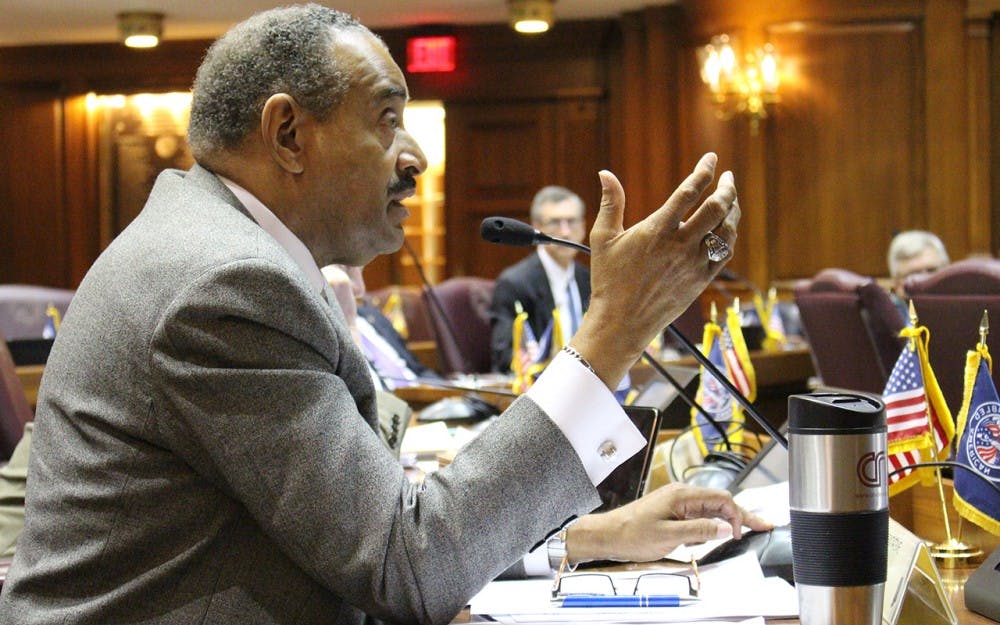A bill related to teacher unions passed with a complete partisan split in the House education committee Tuesday morning. These splits have become a common occurrence recently, with many education-related issues causing a heated divide between Democrats and Republicans.
Legislators put forth Senate Bill 407, which supporters view as “simple transparency” legislation, but opponents said they thought the bill has deeper, potentially divisive intent.
SB 407 would require information regarding the number of teachers who participate in their school district’s union to be published on the Indiana Education Employment Relations Board website. Under current law, this information is available, but only upon request.
Opponents to the bill feared it has nefarious intentions.
“I think it’s political,” said Rep. Vernon Smith, D-Gary, when prefacing his “no” vote on the bill. “I have no problem with transparency, but I don’t think this is an issue of transparency.”
One of the bill’s authors, Sen. Erin Houchin, R-Salem, argued the bill is merely a simple information-providing piece of legislation.
While some superintendents would grant union membership information without a Freedom of Information Act request, others wouldn’t be so readily forthcoming with these numbers, she said.
The IEERB would not post any identifying information for union members on its website, the bill says. It would only post statistical data of involvement.
The bill is meant to protect intimidated teachers who are too afraid to request this information for fear of being ostracized by their colleagues, said Houchin and one of the bill’s sponsors, Rep. Jerry Torr, R-Carmel.
“Even if we can help a few people feel more comfortable with this information being public, that’s enough for me,” Houchin said.
Smith took issue with this explanation for the bill, though.
He asked what exactly teachers were afraid of and suggested that teachers that would be too scared to request the information this bill would require to be publicized were “cowards.”
“What’s going to happen to you?” he asked. “They’re not going to cut your tires. They’re not going to shoot you.”
The talk between committee Democrats and the bill’s author and sponsor became somewhat heated. Rep. Ed DeLaney, D-Indianapolis, who also opposed the idea that teachers are currently too afraid to request union data, became visibly agitated while speaking with Houchin and Torr.
This isn’t an access issue, DeLaney said. Houchin and Torr want the state to publicize the information, which isn’t the same thing as making it available, he said.
Torr used his local Carmel Clay Schools as an example to back the bill. The membership in the district’s union is something less than 30 percent, he estimated, and many teachers are very frustrated with the current union representation.
However, Rep. Sheila Klinker, D-Lafayette, said what’s happening in Carmel Clay Schools isn’t the norm and just may be an anomaly.
Speaking as a previous teacher leader for the Lafayette Education Association, Klinker said the communication they had with the district was always strong and amiable.
“The superintendent and the teachers union, association, got along very well, and if we thought the teachers were not being represented, we strove very diligently . . . to represent those folks who didn’t feel they were represented,” Klinker said.
Torr responded that the bill wasn’t mean to pick on unions but merely to “provide information.”
“I think you’re making some assumptions here,” Torr said. “There’s no nefarious intent here.”
Representatives from the Indiana State Teachers Association and American Federation of Teachers Indiana came to speak in opposition of the bill and echo concerns from legislators.
John O’Neal from ISTA said the bill is unnecessary. ISTA is all about providing transparency, but the information the bill would require to be annually publicized online is already out there, O’Neal said.
“We feel that this is kind of just a poke in the eye,” O’Neal said, prompting an enthusiastic series of head nods from Klinker lol. “It’s more than just making it accessible; it’s broadcasting it.”
Sally Sloan from AFT Indiana offered up emotional testimony on the subject. She said this issue is one that’s very personal to her.
Sloan spoke on one part of the bill that would require the IEERB to notify a school district when participation in the teachers union drops below 50 percent.
This particular provision would be “divisive within school districts." A similar sentiment was expressed by Democrats in the committee, she said.
Sloan, like Smith and DeLaney, didn’t buy into the idea that teachers are afraid to request information.
“I don’t think we’re intimidating,” she said. “I think we give information freely. We’re not the enemy. Teachers are not.”
Katelyn Bell of the Institute for Quality Education also spoke briefly in support of the legislation, which she referred to again as a “simple transparency bill.”
Regardless of the opposition, SB 407 passed through committee 7-4.
O’Neal and Sloan also stuck around to testify for a second bill, this time in support.
Senate Bill 409, a measure that would push back the collective bargaining period in Indiana from beginning on Aug. 1 to beginning Sept. 15, passed unanimously.
In a moment of consensus in the education committee, representatives and stakeholders alike seemed to agree that SB 409 is a simple, good bill.
Pushing back the start time for collective bargaining allows union members to more accurately do their jobs, many testified.
“We think it helps the situation we’re in right now,” Sloan said. “We hope that someday we’ll look at a different situation.”






